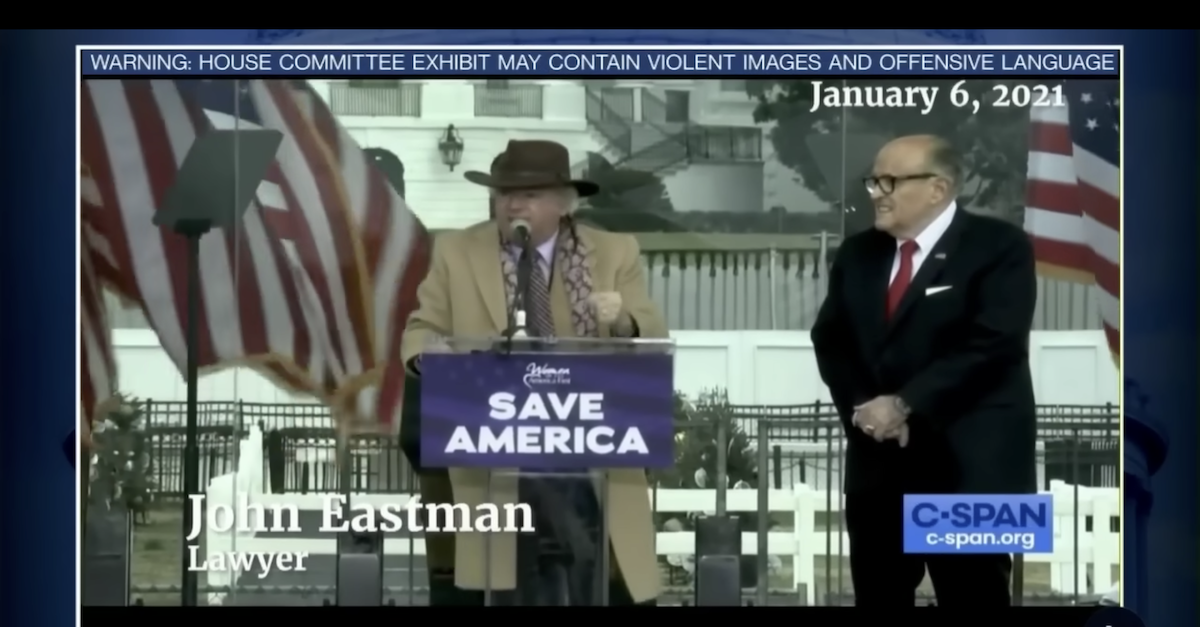
John Eastman speaks in Washington, D.C., on Jan. 6, 2021, alongside Rudy Giuliani. (Screenshot from YouTube.)
A federal judge on Friday rejected a request by John Eastman to reconsider a ruling to release a group of Eastman’s emails to the Jan. 6 Committee. The judge agreed that the Committee had put forth a prima facie case — a basic, plausible, first-impression argument — that Eastman and Donald Trump knowingly “engaged in criminal or fraudulent conduct” when communicating about the 2020 election and conjuring up claims of voter fraud.
U.S. District Judge David O. Carter said Eastman’s most recent request “fails to meet the standards governing motions for reconsideration or a stay” and stood by his decision to apply the crime-fraud exception to privileged documents on Eastman’s Chapman University email server.
“Dr. Eastman’s affidavit presents no evidence that the Court ‘manifestly failed’ to consider when ruling that the crime-fraud exception applies,” Carter wrote in a six-page order issued less than 24 hours after Eastman filed his 10-page reconsideration motion.
Eastman late in the week asked Carter to undo an Oct. 19 decision that skewered Eastman and Trump’s strategy regarding the 2020 election. The Oct. 19 ruling reads in part:
The Court concludes that the crime-fraud exception applies to a number of emails related to President Trump and Dr. Eastman’s (1) court efforts to delay or disrupt the January 6 vote; and (2) their knowing misrepresentation of voter fraud numbers in Georgia when seeking to overturn the election results in federal court.
The judge said the affidavit accompanying Eastman’s Oct. 27 reconsideration motion, which Eastman filed under seal, gives Eastman’s “version of events in the last few days of December 2020” and “points to emails already considered by the Court in reaching its decision.”
The judge also took issue with Eastman filing his reconsideration motion and affidavit under seal, noting that the case “arises out of privileges asserted by Dr. Eastman.”
“To the extent that Dr. Eastman wishes to disclose more communications to clarify his role vis a vis President Trump, his campaign, or other attorneys, nothing prohibits Dr. Eastman from seeking the necessary approvals to waive the privileges where appropriate,” Carter wrote, though he did not unseal the affidavit.
Carter has reviewed 1,272 emails and documents from Eastman’s Chapman server since halting the university from releasing everything from Eastman’s account that the Jan. 6 Committee had requested. He has applied the crime-fraud exception to 10 that wouldn’t have been released to the committee if he hadn’t because he ruled them privileged work product or attorney-client communications. Eight of those crime-fraud exceptions occurred in his Oct. 19 ruling, while his March 28 and June 7 rulings applied the exception to one document each time.
Carter also explained why he was rejecting Eastman’s request to stay the order while Eastman appeals it to the U.S. Court of Appeals for the Ninth Circuit, saying Eastman hasn’t shown “a likelihood of success on the merits, because the contents of the affidavit do not alter the Court’s conclusion.”
“Dr. Eastman does not challenge the Court’s finding of ‘a prima facie case of crime-fraud,’ which can be made ‘either by examining privileged material in camera or by examining independent, non-privileged evidence,'” Carter wrote, quoting from a 2016 Ninth Circuit ruling.
“Nor does Dr. Eastman challenge the preponderance of the evidence standard, which the Court applied in finding that eight emails were sufficiently related to and in furtherance of a crime or fraud,” according to the order.
Carter rejected Eastman’s argument that the only harm from a stay for the Jan. 6 Committee “would be merely a delay in its receipt of documents” by citing the U.S. Court of Appeals for the Columbia Circuit’s Dec. 9, 2021, ruling that affirmed the release of Trump’s White House records to the Jan. 6 Committee.
“The importance of the Committee’s work led the D.C. Circuit to reject arguments similar to Dr. Eastman’s in the context of executive privilege,” Carter wrote.
Eastman filed notice of his Ninth Circuit appeal before the order was issued Friday.